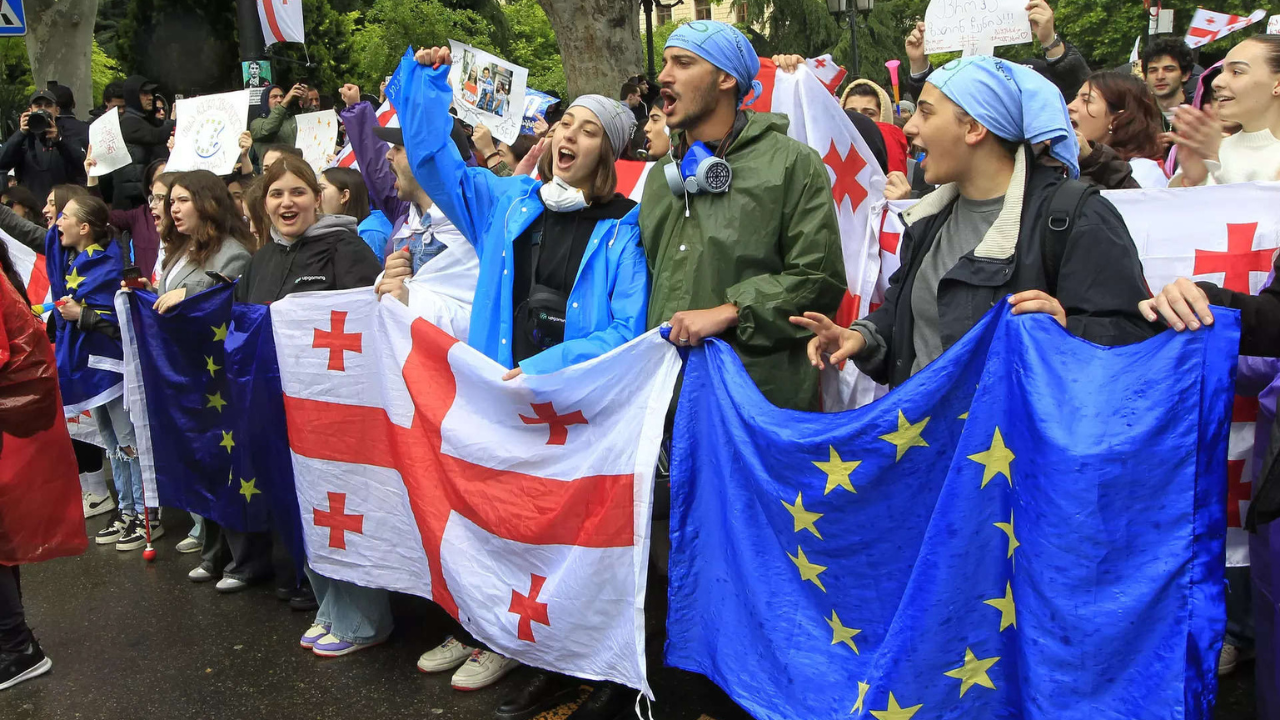TBILISI: The Georgian parliament on Tuesday approved in the third and final reading a divisive bill that sparked weeks of mass protests, with critics seeing it as a threat to democratic freedoms and the country’s aspirations to join the European Union.
The bill requires media and nongovernmental organizations and other nonprofits to register as “pursuing the interests of a foreign power” if they receive more than 20% of their funding from abroad.
The government says the bill is necessary to stem what it deems as harmful foreign influence over the country’s politics and to prevent unspecified foreign actors from trying to destabilize it.
The opposition has denounced the bill as “the Russian law,” because Moscow uses similar legislation to crack down on independent news media, nonprofits and activists critical of the Kremlin.
Mass protests against the law in recent weeks have swept the South Caucasus nation of 3.7 million.
European Council President Charles Michel on Tuesday spoke of Georgian lawmakers in Copenhagen, at a conference on democracy, and said that “if they want to join the EU, they have to respect the fundamental principles of the rule of law and the democratic principles.”
The bill is nearly identical to one that the governing Georgian Dream party was pressured to withdraw last year after street protests. Renewed demonstrations have rocked Georgia for weeks, with demonstrators scuffling with police, who used tear gas and water cannons to disperse the crowds.
Georgian President Salome Zourabichvili, who is increasingly at odds with the governing party, has vowed to veto the law, but Georgian Dream party has the sufficient majority to override a presidential veto. After the final reading in the parliament, the law will be sent to Zourabichvili, and she has 14 days to either veto or approve it.
A brawl erupted in the parliament as lawmakers were debating the bill earlier on Tuesday.
Georgian Dream MP Dimitry Samkharadze was seen charging toward Levan Khabeishvili, the chairman of main opposition party United National Movement, after Khabeishvili accused him of organizing mobs to beat up opposition supporters.
In recent days, several protesters and opposition members have been beaten up. The opposition linked the incidents to the protests.
The bill requires media and nongovernmental organizations and other nonprofits to register as “pursuing the interests of a foreign power” if they receive more than 20% of their funding from abroad.
The government says the bill is necessary to stem what it deems as harmful foreign influence over the country’s politics and to prevent unspecified foreign actors from trying to destabilize it.
The opposition has denounced the bill as “the Russian law,” because Moscow uses similar legislation to crack down on independent news media, nonprofits and activists critical of the Kremlin.
Mass protests against the law in recent weeks have swept the South Caucasus nation of 3.7 million.
European Council President Charles Michel on Tuesday spoke of Georgian lawmakers in Copenhagen, at a conference on democracy, and said that “if they want to join the EU, they have to respect the fundamental principles of the rule of law and the democratic principles.”
The bill is nearly identical to one that the governing Georgian Dream party was pressured to withdraw last year after street protests. Renewed demonstrations have rocked Georgia for weeks, with demonstrators scuffling with police, who used tear gas and water cannons to disperse the crowds.
Georgian President Salome Zourabichvili, who is increasingly at odds with the governing party, has vowed to veto the law, but Georgian Dream party has the sufficient majority to override a presidential veto. After the final reading in the parliament, the law will be sent to Zourabichvili, and she has 14 days to either veto or approve it.
A brawl erupted in the parliament as lawmakers were debating the bill earlier on Tuesday.
Georgian Dream MP Dimitry Samkharadze was seen charging toward Levan Khabeishvili, the chairman of main opposition party United National Movement, after Khabeishvili accused him of organizing mobs to beat up opposition supporters.
In recent days, several protesters and opposition members have been beaten up. The opposition linked the incidents to the protests.

